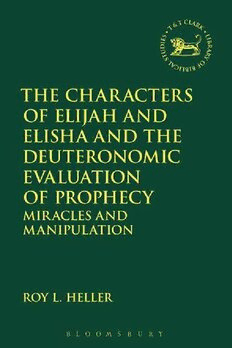
The Characters of Elijah and Elisha and The Deuteronomic Evaluation of Prophecy PDF
266 Pages·2018·2.462 MB·English
Most books are stored in the elastic cloud where traffic is expensive. For this reason, we have a limit on daily download.
Preview The Characters of Elijah and Elisha and The Deuteronomic Evaluation of Prophecy
Description:
This study looks at the prophets Elijah and Elisha in the books of Kings charting a two-fold characterization that portrays these prophetic figures in both positive and negative lights. In the narratives of Kings Elijah and Elisha often parallel other prophetic figures from Israel’s history: they perform miraculous signs, they speak in the name of God, and they pronounce judgments upon the nation of Israel for its idolatrous worship. There are, however, other stories which have troubled readers and scholars alike: Elijah’s cowardly running from the threats of Jezebel, his self-pitying complaint to God that he was the only true Israelite left, and Elisha’s cursing a group of little boys who, in turn, are slaughtered by two female bears. Scholars have traditionally ignored or belittled the negative stories of the prophets, seeing them as either late additions to the biblical text or as minor, unimportant stories that can easily be dismissed.Heller, however, argues that the dual characterization of Elijah and Elisha reflects an ambivalent attitude that the narrator of Kings has toward prophecy as a whole, an attitude that is reflected in the book of Deuteronomy itself. This forces readers of the biblical text to pose the question; “how may Israel best know and follow God?” The stories of Elijah and Elisha make the answer clear: the words and lives of the prophets are a possible way for God to reveal how Israel is to live, but those words and lives must always be considered with a degree of suspicion and must always be evaluated in light of the clear and straightforward teaching of Deuteronomy.
See more
The list of books you might like
Most books are stored in the elastic cloud where traffic is expensive. For this reason, we have a limit on daily download.
